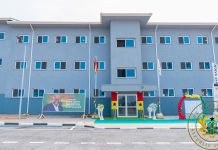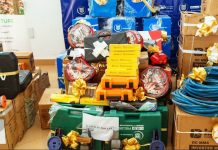Some local cocoa and livestock farmers at Datano, a farming community at Sefwi Wiawso, in the Western North Region of Ghana, have expressed their appreciation to the Rainforest Alliance for building their capacities and helping them to achieve maximum yields and higher incomes from their agricultural businesses.
In separate interviews, Mr. Isaac Kwadwo Owusu, a Cocoa farmer and Madam Doris Asampong, a pig and vegetable farmer, both explained that they have become better managers of their farms after receiving training and other technical guidance from Rainforest Alliance and its partners.
They made the disclosure when the Board of Directors and Leadership Team of Rainforest Alliance paid a working visit to the Western North Region to interact with the beneficiary farmers and community leaders on the impact of the projects and programs of the organisation on the lives of people in the Sui River Landscape.
The Rainforest Alliance is an International Non-profit organisation working to create a world where people and nature thrive together, using social and market forces to protect nature and improve the lives of farmers and forest communities.
Mr. Isaac Owusu, who is the President of the Youth in Cocoa Farming in the area, revealed that the organisation some four years ago introduced him and many other farmers to climate smart agriculture, which has helped his farm to record unprecedented improvement in yields and profit margins.
The organisation, he indicated, also supported him and other farmers to register all the trees on their farms in their names with the Forestry Commission, in order to own the trees as an added profit, aside their cocoa farms, and further explained that Rainforest Alliance has also empowered many of the cocoa farmers to go into pig, bee and snail farming to maximise their profits.
On her part, Madam Doris Asampong noted that she developed the interest to go into pig farming following the advocacy, training and resources she received from the Rainforest Alliance to start the business.
She explained further that even though Pig farming is predominantly a male dominated activity in the area, she decided to take on the challenge of rearing pigs after she was exposed to the commercial viability of the business through Rainforest Alliance’s training program and other logistic support to her and other farmers.
On their part, both the Chief Executive Officer of Rainforest Alliance Mr. Santiago Gowland and the Country Director Mr. Kwame Osei expressed appreciation to the farmers for strictly adhering to the requirements of their training and being good ambassadors of the organisation.
They admonished them to continue to guard against practices that will harm the environment or degrade the forest.
Since 2017, the Rainforest Alliance and its partners have been working in the Sui River Landscape, which covers four districts, Bibiani-Anhwiaso-Bekwai, Sefwi Wiawso, Akontombra and Bodi districts in the Western North region of Ghana.
The various interventions in the area including the establishment of Land Management Boards (LMBs) seek to complement the efforts of the state to, among other things, govern the natural resources in the forest corridors of the area.
The organisation is also implementing several projects and programs in the area, including the Landscapes and Environmental Agility Across the Nation (LEAN) project which is being implemented in collaboration with Tropenbos Ghana, Ecocare Ghana and World Vision Ghana with funding from the European Union (EU).
Through the implementation of this project, over 4,000 farmers have been trained on Climate Smart Agriculture in 60 communities to increase farm productivity and efficiency, reduce environmental impact and increase smallholder farmers’ capacity to adapt to climate change.
Other projects being implemented by Rainforest Alliance Ghana in the Sui River Landscape include the Climate Smart Cocoa project which has so far raised and distributed over 275,000 indigenous tree seedlings to over 3,600 farmers and other partner institutions to help in restoring over 2,000 hectares of degraded land and the Jurisdictional Data Project, which is also so far conducting an analysis of the data gaps and capacity needs of the landscape to meet the information and data requirements to participate and report under the Land Scale.
Pix & story by Edmond Gyebi & David Babayara









